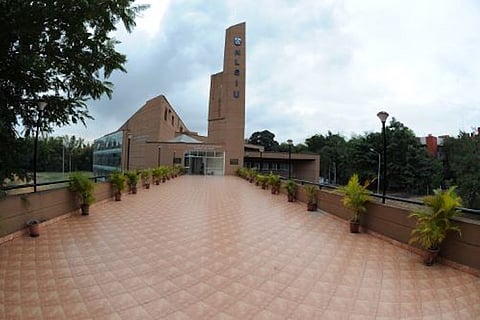

The decision of the Bengaluru-based National Law School of India University (NLSIU) to not accept the Common Law Admission Test (CLAT) scores this year and conduct its own online entrance test has caused a furore among aspirants and even alumni. On Tuesday, Professor Venkat Rao, a former Vice-Chancellor of the University, moved the Supreme Court to challenge the institution’s decision.
NLSIU will be holding the National Law Aptitude Test (NLAT) for admissions to the law course for the academic year 2020-21 on September 12.
NLSIU had cited the delay in holding the CLAT exams this year due to the circumstances around the coronavirus pandemic in India as the primary reason for its decision. University officials reiterated that they will go ahead with the NLAT examination despite a letter from the consortium of National Law Universities asking NLSIU to reconsider its decision.
The institution was also criticised for its extensive rules stipulated to write the exam in the first place. Earlier, a notice from NLSIU that listed requirements for appearing for the entrance exam. The notice stated that only laptops and desktops with a minimum 1 mbps internet connection speed will be able to appear for the examination. “No iPads or mobile phones will be allowed. The systems should also have an integrated webcam and Windows operating system, and Macbooks will not be allowed. The exam should be given using Google Chrome. Aspirants must also disable any AntiVirus installed on their system,” read the requirements first posted by NLSIU.
This notice was met with backlash from students and NLS alumni. Reservations were also raised by the Student Bar Association at NLSIU. “We realise there are multiple concerns regarding the accessibility of NLAT especially given the technical requirements and lack of clarity regarding several points,” the student bar association said in a statement.
It added that some students will help aspirants ensure they have equipment to appear for the examination. “Taking the lead, some of our students had already started an initiative to ensure technical equipment such as laptops, dongles, etc, at least are available to aspirants who need them,” the statement added.
Following this, NLSIU issued an updated circular making changes to the technical requirements for the examination. In the updated notice, the NLSIU allowed students to appear for the exams on Mac and Linux devices as well as Android mobile phones. The required internet bandwidth required was reduced to 512 kbps from 1 mbps and NLSIU also said that 14 exam centres will be set up in different cities where the students can appear for the exams.
However, amid the pandemic, many students are facing difficulties in reaching the centres too, due to a lack of private transport and continued disruptions to public transport. Many also do not have facilities to write the exam from their homes as they do not have the required internet bandwidth or applications to access the examination.
21-year-old Raghunandan, an aspirant from Jammu, tells TNM that he only has 2G internet on his phone. "We only have 2G internet, but there is a cyber cafe nearby which has broadband connection, and I am thinking of going there to give the exam. Many others don't even have laptops or mobile phones and they have already left for Delhi to give the exam. However, there is a risk amid the pandemic and my parents are not allowing (me to travel to Delhi). NLSIU's decision has also added to the burden because now we have to study for two different examinations."
Vikram Hegde, an advocate-on-record in the Supreme Court and an NLS alumnus, told TNM that the new changes are welcome but they are not enough.
“The changes are welcome but more needs to be done. Candidates who have been in touch with me have expressed that their problem is that they only have mobile internet. I don't know if the 14 centres mitigate their problems in view of the absence of regular public transport everywhere,” Vikram Hegde told TNM.